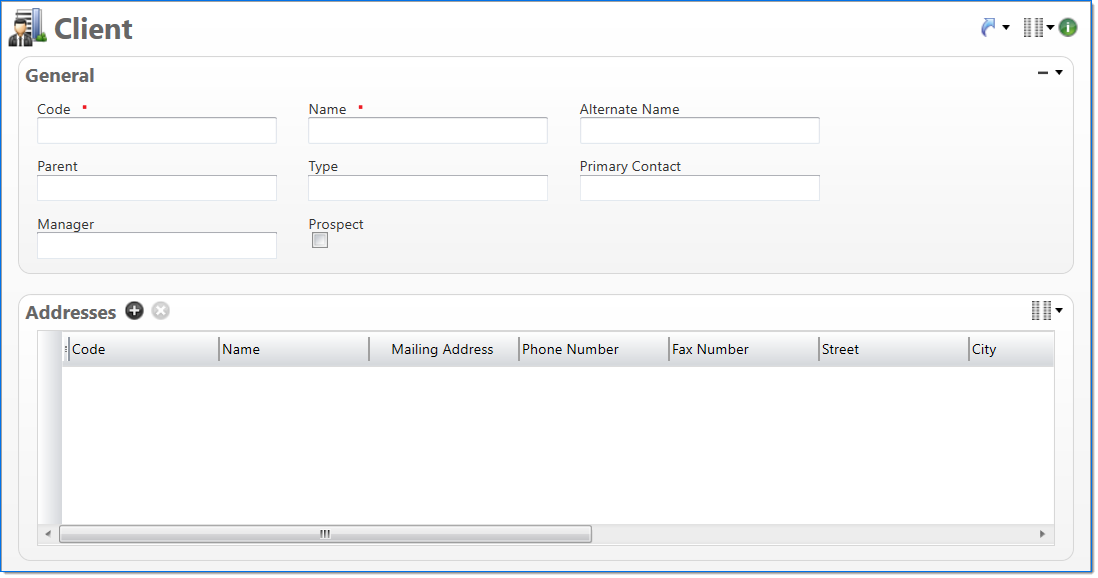Client - Business Development View - Screen Description
The Client screen allows you to add and define clients. A client is an entity that contracts services from the company. Each client contains the trade and relationship information that is used for projects, billings, and collections.
- To create a new contact, opportunity, or project that includes a client's information, open the client and then click the Related Items
 button and select the New Contact, New Opportunity, or New Project option. A new, unsaved document with the client's information will be displayed.
button and select the New Contact, New Opportunity, or New Project option. A new, unsaved document with the client's information will be displayed.

General
In the General area, enter client information.
| Req'd | Field | Description |
|---|---|---|

|
Code | Enter a unique alphanumeric key to identify the document. Once a code has been entered and the document has been submitted to final, it typically cannot be changed. This field automatically prepopulates and be read-only if an auto-counter has been defined for this type of document. |

|
Name | Enter a name to describe the document. The name does not have to be unique. |
| Alternate Name |
Enter an alternate name for the client. |
|
| Parent |
Enter or select the client's parent company. This could be necessary when a client has multiple divisions or affiliates. When used, this field allows multiple clients to be grouped and reported on as one consolidated client. If the client does not have a Parent, this field can be left blank. |
|
| Type |
Enter or select an active client type. This is a reporting parameter that is used to group and sort client data. |
|
| Primary Contact | Enter or select an active contact. This is the primary contact used for important communications. | |
| Manager | Enter or select the employee who manages the relationship with the client or prospect. Only active or pending active employees can be selected. | |
| Prospect | Select if the client is a prospect. This implies that the business organization is a potential customer of the firm’s professional service offerings. |
Address
In the Address area, enter one or more addresses. It is used to track addresses of different locations. Multiple addresses can be defined. Each address code must be unique for the client.
| *Req'd | Field | Description |
|---|---|---|

|
Code |
Enter a code for the address. This must be unique to the document instance but does not have to be globally unique. |

|
Name | Enter a name to describe the address. This does not have to be unique. |
| Mailing Address |
Select if this address can be used to send and receive mail. If selected, Street, City, and Country are required. |
|
| Phone Number | Enter a telephone number for the contact. | |
|
Fax Number |
Enter a fax number for the contact. | |
| Street | Enter the street address. This field is required when Mailing Address is selected. | |
| City | Enter the city. This field is required when Mailing Address is selected. | |
| State/Province | Enter or select the state or province. This field is required when Mailing Address is selected and the selected Country is set to have States or Provinces. For more information, see Country. | |
| Zip/Postal Code | Enter the zip or postal code. This field is required when Mailing Address is selected and the selected Country is set to have postal codes. For more information, see Country. | |
| Country | Enter or select the country. This field is required when Mailing Address is selected. | |
| Status | Select the status of the address. | |
| Primary | Select if this is the primary address. |